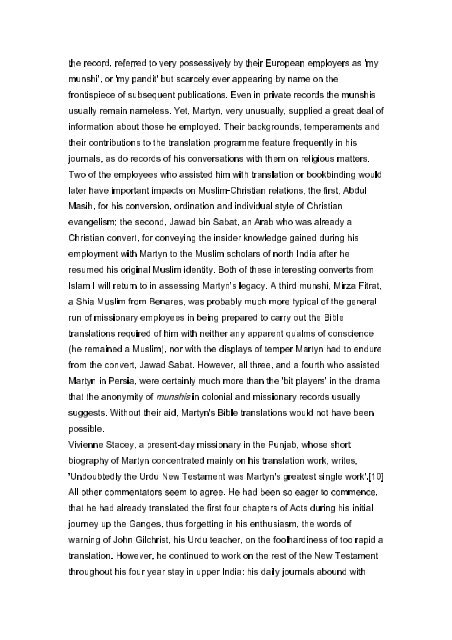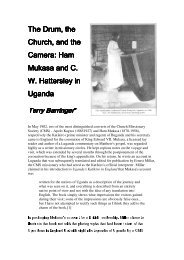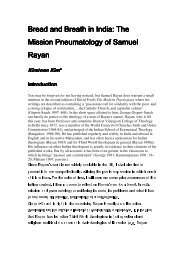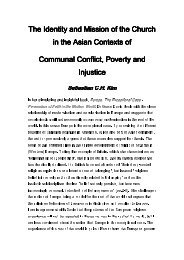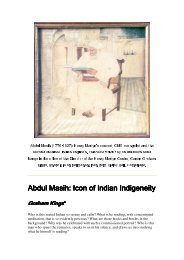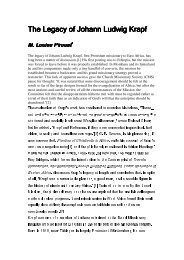the legacy of henry martyn to the study of india's muslims and islam ...
the legacy of henry martyn to the study of india's muslims and islam ...
the legacy of henry martyn to the study of india's muslims and islam ...
You also want an ePaper? Increase the reach of your titles
YUMPU automatically turns print PDFs into web optimized ePapers that Google loves.
ecord, referred <strong>to</strong> very possessively by <strong>the</strong>ir European employers as 'my munshi', 'my p<strong>and</strong>it' but scarcely ever appearing by name on frontispiece <strong>of</strong> subsequent publications. Even private records <strong>the</strong> munshis usually remain nameless. Yet, Martyn, very unusually, supplied a great deal <strong>of</strong> information about those he employed. Their backgrounds, temperaments <strong>and</strong> <strong>the</strong><br />
contributions <strong>to</strong> <strong>the</strong> translation programme feature frequently journals, as do records <strong>of</strong> his conversations with <strong>the</strong>m religious matters. Two <strong>of</strong> <strong>the</strong> employees who assisted him with translation or bookbinding would later have important impacts Muslim-Christian relations, <strong>the</strong> first, Abdul Masih, for his conversion, ordination <strong>and</strong> individual style <strong>of</strong> Christian <strong>the</strong>ir<br />
<strong>the</strong> second, Jawad bin Sabat, Arab who was already a Christian convert, for conveying <strong>the</strong> insider knowledge gained during his employment with Martyn <strong>to</strong> <strong>the</strong> Muslim scholars <strong>of</strong> north India after he evangelism;<br />
his original Muslim identity. Both <strong>of</strong> <strong>the</strong>se interesting converts from Islam I will return <strong>to</strong> in assessing Martyn's <strong>legacy</strong>. A third munshi, Mirza Fitrat, a Shia Muslim from Benares, was probably much more typical <strong>of</strong> <strong>the</strong> general run <strong>of</strong> missionary employees being prepared <strong>to</strong> carry out <strong>the</strong> Bible translations required <strong>of</strong> him nei<strong>the</strong>r any apparent qualms <strong>of</strong> conscience resumed<br />
remained a Muslim), nor with displays <strong>of</strong> temper Martyn had <strong>to</strong> endure from convert, Jawad Sabat. However, all three, <strong>and</strong> a fourth who assisted Martyn Persia, were certainly much more than <strong>the</strong> 'bit players' in <strong>the</strong> drama that <strong>the</strong> anonymity <strong>of</strong> munshis in colonial <strong>and</strong> missionary records usually suggests. Without <strong>the</strong>ir aid, Martyn's Bible translations would not have been (he<br />
Vivienne Stacey, a present-day missionary in <strong>the</strong> Punjab, whose short biography <strong>of</strong> Martyn concentrated mainly on his translation work, writes, possible.<br />
<strong>the</strong> Urdu New Testament was Martyn's greatest single work'.[10] All o<strong>the</strong>r commenta<strong>to</strong>rs seem <strong>to</strong> agree. He had been so eager <strong>to</strong> commence, that had already translated <strong>the</strong> first four chapters <strong>of</strong> Acts during his initial journey up <strong>the</strong> Ganges, thus forgetting in his enthusiasm, words <strong>of</strong> warning <strong>of</strong> John Gilchrist, his Urdu teacher, foolhardiness <strong>of</strong> <strong>to</strong>o rapid a 'Undoubtedly<br />
However, he continued <strong>to</strong> work on <strong>the</strong> rest <strong>of</strong> <strong>the</strong> New Testament throughout his four year stay upper India: his daily journals abound with translation.


